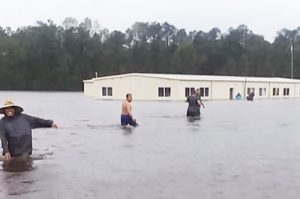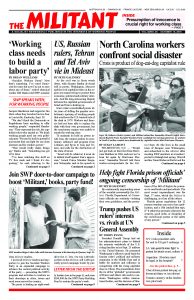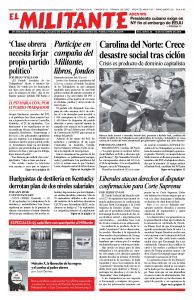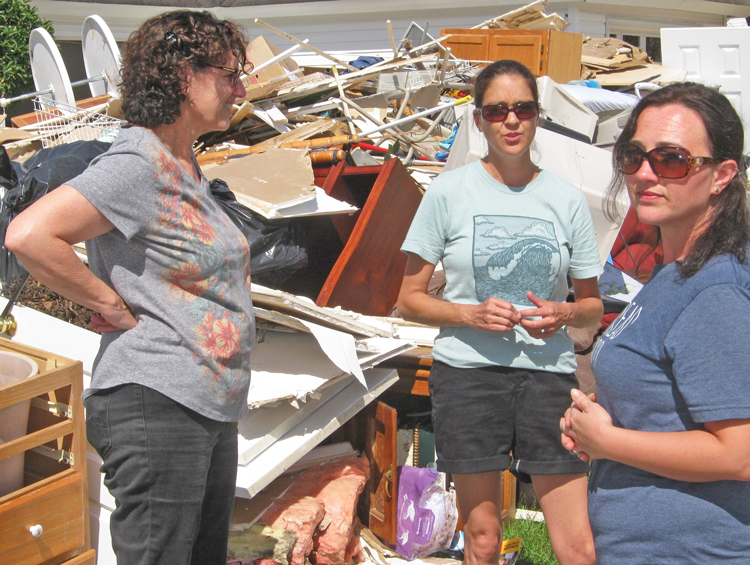WILMINGTON, N.C. — “People just got back on their feet from Hurricane Matthew in 2016, and now we’ve been hit again by Hurricane Florence,” Samantha Worrell told three worker-correspondents for the Militant Sept. 28. She lives in the small town of Burgaw, near Wilmington, and subscribed to the Militant after meeting SWP members at a teachers’ protest in Raleigh last spring. Worrell and her friend Rebecca Stutts took the day to accompany the Socialist Workers Party members around the area, where Hurricane Florence made landfall Sept. 14.
They wanted to introduce us to some of the workers affected by the storm and show us what they’re coping with. The team from Atlanta included Rachele Fruit, Socialist Workers Party candidate for governor of Georgia, myself and Sam Manuel.
We explained to all those we met that the challenges they face are the result of a social catastrophe caused by the dog-eat-dog workings of the capitalist system. It protects private profit at the expense of workers and farmers, who are left on their own to try and cope with disaster.
Government officials ordered some 1.5 million people in the Carolinas and Virginia to evacuate before the hurricane hit. Of those who did, many were left to their own devices to figure out how to do it. Some tried to ride it out, thousands returned a week or so later to find their homes damaged or destroyed by the storm’s winds, heavy rains and record-breaking flooding. Hundreds of miles of roads became impassable.
“The water didn’t rise up to our house,” Samantha Nelson, who lives in a mobile home in nearby Rocky Point, told us. “But a section of the road to our house collapsed. The rain got through our roof and into the walls and ceilings, so black mold is spreading throughout the house. We lost power for 10 days and all our food had to be thrown out.
“You can’t drink or use the water, because it’s contaminated,” she said. “People who have well water have to pay to get it tested. The air is foul.” Federal Emergency Management Agency and Red Cross staff told her that she had to get off her property to be considered for assistance.
“The workers and farmers of Cuba, led by their revolutionary government, show what can be done to minimize the destruction and loss of life from a storm like Florence,” SWP candidate Fruit told Nelson. “Hurricanes are a regular occurrence for Cuba. Even though it’s a poor country compared to the imperialist U.S., whose rulers’ riches come from exploiting working people worldwide, the Cuban government and mass organizations mobilize workers and farmers and the country’s resources to prepare in advance.
“They organize to evacuate people and their animals, to bring in supplies so rebuilding can begin immediately,” Fruit said. “They can do this because they made a socialist revolution and the workers and farmers are in power. That’s why there are so few deaths from hurricanes, compared to the United States.”
“As Raúl Castro said, no one in Cuba is left on their own,” she said.
“That’s so different from here,” said Nelson. “Here there’s no real preparation.”
Workers volunteer to help
Nelson, Worrell and Stutts described many examples of working people pitching in to help each other. While they have each been dealing with their homes and families, they also have been distributing food and clothing and helping others figure out short- and long-term solutions to pressing needs.
As of Sept. 29, the death toll from Hurricane Florence stood at 48, with 37 of them in North Carolina. One of the most recent deaths was of an 85-year-old man from New Hanover County who got an infection in a wound from cleaning up debris on his property.
Hundreds of people were rescued from rising floodwaters by boat or helicopter. Among the volunteers involved in these rescues were members of the Cajun Navy, who came from Louisiana and elsewhere to help. The “navy” formed during Hurricane Katrina in 2005, as workers with boats decided to take action to rescue people and pets, despite attempts by local authorities to block their efforts.
Some 1,500 people still remain in shelters, which authorities are trying to close. More than 550 others are being put up in hotels. Thousands are staying in damaged homes or tents on their property.

Eastern North Carolina is a center of the hog and poultry industries. At least 32 hog waste lagoons were inundated and another five had structural damage, sending huge amounts of animal waste into the floodwaters. The state Department of Agriculture reports the loss of 4.1 million poultry and at least 5,500 hogs.
Because of the storm’s destruction, and the unpreparedness of the bosses, unknown numbers of workers are still without jobs in the Carolinas.
Coal ash from two power plants owned by Duke Energy flooded during the storm, sending millions of gallons of toxic waste, including arsenic, lead and other heavy metals, into nearby rivers.
Lack of clean water for cooking, bathing, washing clothes and other household tasks is an ongoing hardship.
‘Get out in 24 hours’
Before we left Wilmington, Worrell and Stutts wanted us to visit New Providence Park apartments, where they heard reports that tenants were being evicted. When we drove into the complex, we saw dozens of rental trucks and groups of people helping each other load up furniture and other belongings.
“I want to tell you what really happened here and I want you to quote me,” 23-year-old Benjamin Houghton told us. “On Sept. 26 the owners came and put notices on people’s doors, saying we had to be out in 24 hours! They didn’t call or email us or even knock! They said the rain damage meant these buildings had to be gutted and rebuilt. When we protested, they said we had until Saturday to get out.
“Me and my girlfriend are lucky, we found another apartment,” he said. “But some of my neighbors are elderly and live alone. I’ve been trying to help them get packed and figure out where to go.”
Later that afternoon, we visited a small mobile home park in Burgaw where many farmworkers live. “We evacuated for a week to Chapel Hill,” Alejandra Hernandez, 25, said. “We had 25 of us piled into a few hotel rooms.”
North Carolina farmworkers — some 150,000 strong — are often left to fend for themselves when storms approach. Many live in substandard housing located next to fields that lie in flood plains.
A group of over 35 farmworkers working on H-2A temporary visas at Riggs Brothers Farm in Kinston called 911 on Sept. 15 to get rescued. They woke up to find the water in their housing up to their waists. No one came for hours.
Most of the workers told the press they had heard a hurricane was coming, but they had never seen one and had no idea what to expect. Notices about the storm weren’t broadcast in Spanish.
The workers found out later that the farm owner had called authorities to cancel their call for help. He has refused to say why.
In Clinton, northwest of Wilmington, hundreds of farmworkers were bused to area shelters to wait the all-clear to return to work. “We just got here and worked for four days,” Celestino Lara Romero, who came from Mexico, told the Ashville Citizen Times. “We’re wondering how we are going to get paid.”
Sam Manuel contributed to this article.


